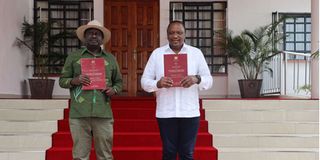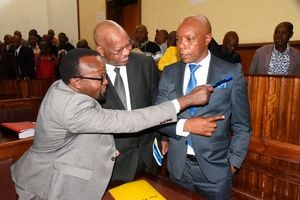BBI proposals ‘echo harmonised draft constitution’

President Kenyatta and ODM leader Raila Odinga display copies of the Building Bridges Initiative report at Kisii State Lodge.
Experts who sat on the team that drafted the 2010 Constitution say the proposals on the executive contained in the Building Bridges Initiative report largely reflect the contents of the 2009 draft that was mutilated in Naivasha by MPs.
Constitutional expert Nzamba Kitonga, who was the chairman of the Committee of Experts on Constitutional Review (CoE) that drafted the Constitution Wednesday said aspects of the structure of the executive widely reflect the contents of the draft his team came up with.
“That’s what we recommended in our harmonised draft, which was then mutilated in Naivasha,” he said.
“The position of prime minister was then removed, as was that of the deputy prime minister and to have a Cabinet comprising both MPs and outsiders . The most grievous mistake was to remove the position of the Leader of Opposition,” he told the Nation.
He said the BBI steering committee’s recommendations were a reflection of the thoughts of the CoE, and ultimately, of the majority of Kenyans.
“They have done what should have been done before. They have regretted the initial mutilation. To that extent, it is in the interest of the country that those positions be retained,” he said.
He debunked the notion that the expansion of the executive would burden taxpayers, stating that “Kenyans must understand the concept of beneficial analysis”.
“This must be looked at in terms of productivity. We must look at what are the benefits. Sometimes it’s not so much about money, but the country; about inclusivity.”
“We can’t complain of an expanded executive when we have about 20 or so people who are CASs (chief administrative secretaries) paid money and earning State privileges and the positions don’t exist in the Constitution,” added Mr Kitonga. Mr Bobby Mkangi, who was also on the CoE, also agreed that the proposal reflects the contents of the harmonised draft constitution taken to Naivasha in November 2009.
“That was the proposal. It reflects to a larger extent the Bomas structure, which is good for the country,” said Mr Mkangi.
Mr Kitonga underscored the relevance of the office of the official opposition leader, noting that it will play a critical role in checking the government.
“In our proposal, it had secretariat as well as auditors who were going to oversight government properly. That was our interest. What Kenyans should be aiming their guns at is this thing called CAS who are just eating money, they are so many but don’t even exist in the constitution.”
They spoke as the report, unveiled Wednesday, was met with divergent opinions.
Whereas some termed the report ‘progressive,’ others opined that it would not solve the ‘inclusivity’ aspect, which its proponents have argued is the cure to the winner-take-all system.
Amani National Congress (ANC) leader Musalia Mudavadi said that, with the report out, there is urgent need for clarity.
“As I have consistently stated, let Kenyans read the report and critically examine it. We need a leadership that will focus on reviving the economy and creating jobs for our youth. Let’s read it and understand it,” said Mr Mudavadi.
Former senate deputy speaker and Tharaka Nithi Senator Kithure Kindiki, however, expressed reservations over claims that the expanded executive would solve inclusivity challenges in the country.
“How on earth can having five out of 43 ethnic communities represented in the National Executive be expected to solve the complex sum of a century of pain, hurt, trauma, predatory exploitation, privatisation of public resources by a small thieving elite in politics and civil service, primitive accumulation, gross human rights violations and impunity?” he posed.
The disconnection between the masses and the privileged, “dynastic” elites and the contempt with which leaders hold the people, he said, is about to play out with eclectic consequences.
“I hope I am wrong; but in the very likely event that I am right, I will be on the people’s side, the right side of history,” he added.
He described the report as using “too much flowery language” and an attempt to re-write the Constitution afresh.
“It doubles the size of Parliament (wage bill) and seeks to reward ethnic chiefs from the five biggest ethnic communities. Nothing to guarantee the ‘inclusion’ of the other 39 ethnicities, not to mention that the underlying philosophy of the report is irredeemably flawed.”
Former Senate majority leader and Elgeyo Marakwet Senator Kipchumba Murkomen said: “As expected, it is totally underwhelming!”
“Those proposing two senators per county do not understand the place of devolution and Senate in our Constitutional architecture and the principle of equality of counties. Every county has only one vote in Senate, what will two senators be doing?” he posed.
Nakuru Governor Lee Kinyanjui, however, threw his weight behind the BBI, describing it as a document that will greatly serve to heal the nation and unite Kenyans.
“The BBI is founded on the need to entrench inclusivity and good governance. If well implemented, it will allow the country to address the recurrent problems of political marginalisation, corruption and tribalism. However, it should create a debate bigger than the current political actors,” said Mr Kinyanjui.
Nakuru Jubilee Party Secretary-General Peter Mtumishi Cheruiyot said the BBI would create opportunities for all. People's Power Watch lobby group chairman Jesse Karanja also echoed the sentiments, saying that, if well implemented, the proposals will end ethnic violence witnessed during elections.
“We support the BBI because it will bring peace and unity. Many communities have been feeling left out, especially after every election cycle, but the document will bring inclusivity,” he told the Nation.
Naivasha MP Jayne Kihara said she will first read the released BBI report before expressing her views.
She called on Kenyans to read and understand the contents in the document, but expressed concerns over the decision to isolate Deputy President William Ruto while making public the document.
“We cannot talk about uniting the country while deliberately leaving out a section of leaders,” said the Naivasha MP.
Mrs Kihara termed the decision as curious and said it cast doubts on the unity that the document was meant to achieve.
Reporting by Justus Ochieng’, Eric Matara and Macharia Mwangi
(Download a copy of the BBI Report: BBI REPORT)





